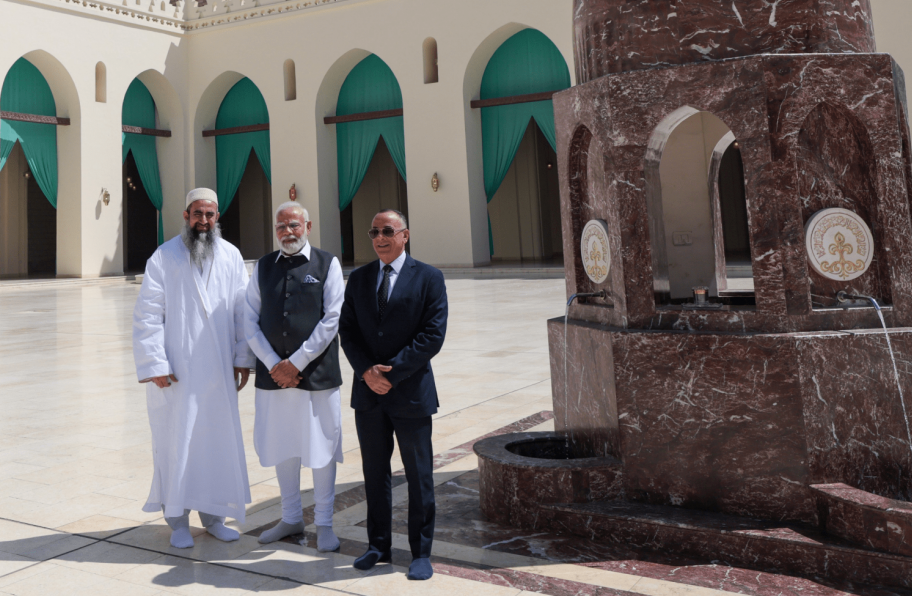Modi visits Cairo mosque restored by Dawoodi Bohra
Egyptian President al-Sisi invited to the G20 in Delhi during the first visit by an Indian prime minister to Egypt in 26 years. During his stay, Modi visited the al-Hakim mosque, a place dear to a small Islamic community in Gujarat, allied with the BJP. This comes after he dismissed a reporter’s question in Washington centred on allegations that several Indian laws and policies violate the rights of Muslims.
Cairo (AsiaNews/Agencies) – After his US visit, Indian Prime Minister Narendra Modi made a significant stop in Cairo, where he met with Egyptian President Abdel Fattah al-Sisi.
This is the first visit to Egypt by an Indian prime minister in 26 years. During his stay, Modi officially invited al-Sisi to attend the G20 summit in New Delhi in September.
Egypt is one of the countries that have officially asked to join the BRICS group (a global forum that includes Brazil, Russia, India, China, and South Africa set up as an alternative to the G7).
The summit in Cairo also provided the two leaders with the opportunity to sign a series of bilateral agreements on issues ranging from agriculture to the protection of their archaeological heritage.
Culture and religion also played an important part in Modi’s visit, particularly as it might affect India’s domestic affairs. In fact, the prime minister visited Cairo’s 11th century al-Hakim mosque, which was recently restored thanks to Dawoodi Bohra, an Indian Ismaili Shi'a group.
Originally from Egypt, the community of about half a million is concentrated in Modi’s home state of Gujarat, where he started his political career that led him to the prime minister’s office.
Relations between Hindus and Muslims in the state remain tense, especially since communal riots broke out in 2002 causing major bloodshed.
Although they are Muslim, the Dawoodi Bohra have a long-established relationship with the Bharatiya Janata Party (BJP), Modi’s ruling Hindu nationalist party, this according to Mint, an Indian online business publication.
As a sign of the close ties, the prime minister has described the community as “patriotic”, noting its support when he was in power in Gujarat. This gives his visit to the Cairo mosque strong political overtones as he praised Indian Muslims for its restoration.
Still Modi's ties to Dawoodi Bohra are at odds with the situation back home, where the BJP is accused of consistently pushing forward anti-Muslim laws and policies since the prime minister came to power.
For many India watchers, minority rights have been dealt a severe blow under the Modi administration.
The issue was highlighted by the first question posed by a Wall Street Journal reporter to Modi during his press conference in the United States.
Generally, the Indian prime minister does not hold press conferences; the last one he gave before his US visit was in London in 2015.
When responding to the question about allegations of mistreatment of Muslims in India, Modi said that he was “surprised” by the query, answering evasively that since India was a democracy there could be no discrimination or violation of human rights in the country.
Photo: Narendra Modi’s Twitter account
05/09/2019 13:19
25/02/2020 11:06







.png)










